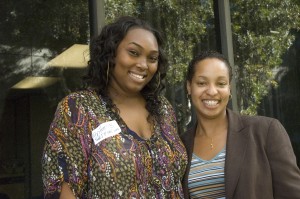From its beginnings in 2005 as a small discussion group for black female students residing in campus housing, Sisters United has grown to encompass the needs of all African and African American female students at California State University, Dominguez Hills. By facilitating one-on-one mentorships with faculty or staff members, the program has been instrumental in ensuring the success of students by helping them balance maintaining academic excellence with all other aspects of their lives.

Brittany Ball, a junior majoring in negotiation, conflict resolution, and peacebuilding, says that being involved in Sisters United for the last three years has “really enhanced my experience at the university. The program really motivates me to want to get more involved on campus and is something that I really look forward to being a part of every semester.”
Dr. Tiffany Herbert, who founded Sisters United with Joyce Johnson, emerita professor of English, says that she always receives a great response when recruiting new mentors to the program, many of whom are members of the Black Faculty and Staff Association.
“Each faculty and staff member that I have asked to be a mentor has stepped up to the plate,” she says. “The relationship is a two-way street in that mentors learn a lot about the lives of students and develop empathy for all that [they] have to face to make it through this process. I strongly believe this affects all of us in the work we do and the services we deliver to students.”
Herbert says that her involvement with Sisters United has enriched her experiences on the job by drawing upon her training in community psychology.
“My goal at CSU Dominguez Hills has always been to contribute to creating a culture of mental health,” says Herbert. “I am very lucky to have the opportunity to work with students on an individual basis as well as to change perceptions of mental health among students across campus. Through education, availability, and resources I have witnessed the campus community and students in particular, becoming more willing to access help. This has debunked many myths–especially within minority populations–about mental health services.”
Sisters United is designed to pair students with faculty and staff members who often have career interests or academic backgrounds in common. Herbert asks that each mentor make contact with their mentee at least twice a month. She also hosts monthly mixers for them to interact with other student-mentor pairs and to share information with students on issues including campus resources, time management, and sexual health.
Ball says that the most important thing that mentors and their students have in common is the successful pursuit of an educational goal.
“It is so easy to lose focus of what we are all really here for, and to have amazing people who we can call up for a few words of encouragement is really vital,” she says. “The reality of it all is that life does not stop just because we are students. Dealing with unexpected life problems is hard when you are a student, but having someone in our corner to back us up really makes this experience easier.”
Herbert credits the support of Associated Students, Inc., for helping Sisters United expand and serve more students over the years. She also says that she is grateful for the support of her colleagues who give their time and talents as mentors–and for whom the work is its own reward.
“Every mentor has expressed feelings of pride in being a mentor,” she says. “I think it feels really good when you know you are helping someone succeed in life.”
Although still a student, Ball has been inspired by the program to someday give back to Sisters United as a mentor herself.
“My experience with Dr. Herbert and Sisters United has definitely inspired me to want to help other students in the near future with their journey,” she says. “I want to help other young women achieve their goals as well and help motivate so they too can excel to greater heights.”
For more information on Sisters United, click here.